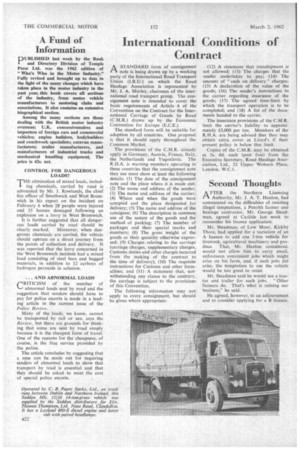A Fund of Information
Page 58

If you've noticed an error in this article please click here to report it so we can fix it.
DUBLISHED last week by the Book
I and Directory Division of Temple Press Ltd. was the 1962 edition of "Who's Who in the Motor Industry." Fully revised and brought up to date in the light of the many changes which have taken place in the motor industry in the past year, this book covers all sections of the industry, from motor vehicle manufacturers to motoring dubs and associations. It also contains an extensive biographical section.
Among the many sections are those dealing with the British motor industry overseas; U.K. concessionnaires and importers of foreign cars and commercial vehicles; engine builders, bodybuilders and coachwork specialists; caravan manufacturers; trailer manufacturers, and manufacturers of industrial trucks and mechanical handling equipment. The price is 42s. net.
CONTROL FOR DANGEROUS LOADS?
THE elimination of mixed loads, including chemicals, carried by road is advocated by Mr. J. Rowlands, the chief fire officer of Smethwick and West Bromwich in his report on the incident on February 6 when 28 people were injured and 35 houses damaged following an explosion on a lorry in West Bromwich.
It is further suggested that all dangerous loads carried by road should be clearly marked. Moreover, when dangerous chemicals are carried, the vehicle should operate on a direct journey from the points of collection and delivery. It was reported that the lorry concerned in the West Bromwich incident had a mixed load consisting of steel bars and bagged materials, in addition to 12 carboys of hydrogen peroxide in solution.
... AND ABNORMAL LOADS
r WITTC1SM of the number of
abnormal loads sent by road and the suggestion that senders should have to pay for police escorts is made in a leading article in the current issue of the Police Review.
Many of the loads, we know, cannot be transported by rail or sea, says the Review, but there are grounds for thinking that some are sent by road simply because it is the cheapest form of travel. One of the reasons for the cheapness, of course, is the free service provided by the police.
The article concludes by suggesting that a case can be made out for requiring senders of abnormal loads to show that transport by road is essential and that they should be asked to meet the cost of special police escorts.




















































































































































